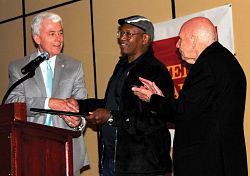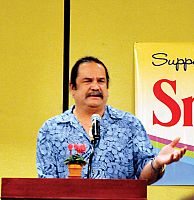Success stories illuminate CCS' impact on homeless

SALT LAKE CITY — Ronald Henry describes himself as a U.S. Army veteran, a drug addict and an alcoholic. He’s been clean for 10 years, but in 2009, after struggling for 18 months, he and his family lost their home. "I was afraid that if I ended up on the streets I would become the person I was trying to get away from," Henry said. "I ended up at Saint Mary’s Home for Men and in this little place – it’s an oasis in the world of turmoil that we go through as addicts and alcoholics." A residential substance abuse treatment center in Salt Lake City run by Catholic Community Services, St. Mary’s is for men who have already undergone detox. The 40-bed facility allows residents to stay for up to two years. Its clients are referred, mostly through the Veterans Association and Salt Lake County. "It’s a home for men who don’t have any other place to go," Henry said, who has used his time at the facility to begin studying for a master’s degree in social work so that he can begin helping people like himself. "I know how to do it," he said. "I know where they came from and I know where they can go." St. Mary’s is a tight-knit community where people can put their guard down, he said. "It’s a place where they don’t just look at the addict or the alcoholic, they look at the person who’s inside. That’s the one that they talk to, and that’s the one that they try to help, because that’s the one that needs the help." Henry told his story at the fourth annual CCS Dream Builder’s Breakfast, held this year on April 28 at the Marriott Downtown in Salt Lake City. In alternate years the breakfast is held in Ogden, where CCS also has facilities. Henry’s children attended the breakfast, and he said they are his strength. "Getting through an addiction is the hardest thing that I have fought in my life," he said, adding that addiction "keeps you going until you have nothing, until your family is sick and tired of watching … you kill yourself. They don’t get away from you, they just step back." He has been a St. Mary resident for about 18 months, so soon he will need to find his own place. "I’m kind of scared to go out there by myself, but I’m learning how to do that. I will. I will. I will make it," he said. "St. Mary’s is a really good place and I hope that you people could just come and see what we are." Having people see the impact of St. Mary’s and other CCS programs is the purpose of the Dream Builder’s breakfast, said CCS Director of Development & Marketing Kathryn Brussard. In addition to St. Mary’s, CCS runs nine other programs, including refugee resettlement, immigration, refugee foster care and the food bank in Ogden. Another CCS success story told at the breakfast was that of William Pinkey, who now is property supervisor for Catholic Community Services’ basic needs services. "I was raised in drugs and alcohol," Pinkey said in a DVD presentation. "I was shooting drugs when I was 12, I was smoking when I was 10. I was raised in the ghetto; that was all I knew. You don’t have a chance in life as long as you’re doing those kinds of things. It took me 37 years to get clean and sober." Once he got clean and sober, he learned that there was a lifestyle other than drugs and alcohol and he liked that lifestyle better, he said. "I had a lot of people help me. Catholic Community Services gave me a job, but I work here and stay here because I was out here like the rest of the people that are here," Pinkey said. "I used to be homeless. I walked their walk. I got myself clean and sober and now I try to help other people do the same. It’s about helping somebody else the way that somebody else helped me." The people he now serves get stereotyped, he said. "People just look at them, because they’re homeless, they’ve got to be drug addicts or alcoholics and things like that. They’re not, a lot of them. A lot of good people are down on their luck and they need somebody that’s going to be there for them." People who donate to CCS are "giving a person a chance to change," Pinkey said. "That’s what all Christian people are supposed to do, try to help them to change to get their lives right. I would tell everybody, keep on donating, keep on donating if you can. Times are hard. And the people here, most of them gave up because the times are so hard in this day and age. People’s donations give people hope again, and once people get hope again people can get up out of this. But without the people’s hope or without the people’s help, these people down here aren’t going to make it, and I know because I’m one of those people that got helped, and I made it." CCS provided more than a half million services last year to 50,000 clients, almost half of them children. Its administrative costs are 7 percent of the budget. For information, visit www.ccsutah.org.
© Copyright 2024 The Diocese of Salt Lake City. All rights reserved.


Stay Connected With Us